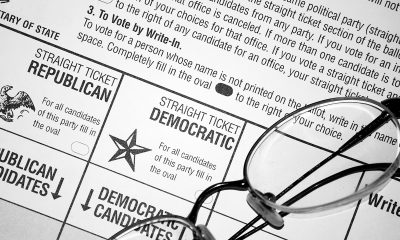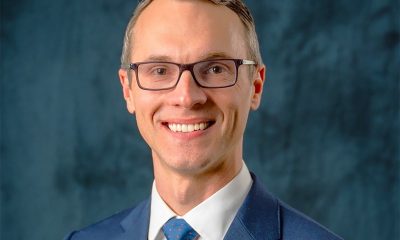National
2013: The year in quotes
A look back at who said what last year
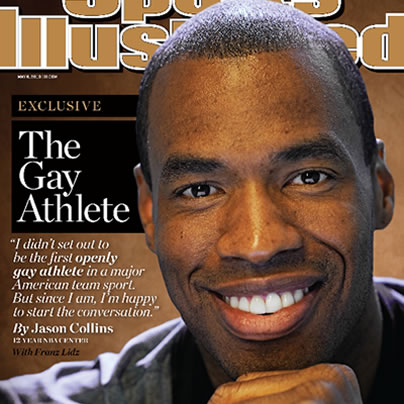
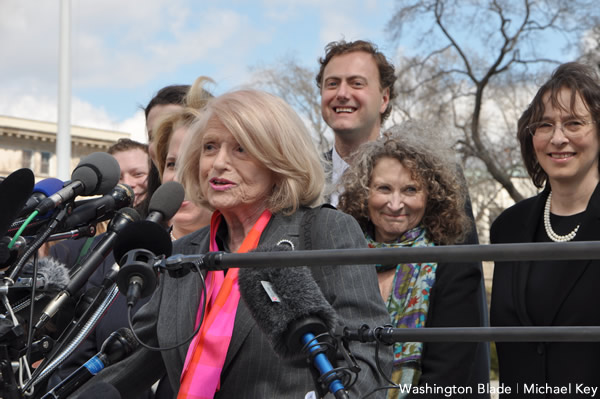
Edith Windsor (Washington Blade photo by Michael Key)
“The gay community is my ‘person of the year’ and I look forward to continuing to fight for equal rights and educate the public about our lives alongside my gay brothers and sisters and our allies … Thea would be thrilled, proud and so happy to see what we have all accomplished together.” Edith Windsor, the plaintiff in the Supreme Court case that overturned the Defense of Marriage Act, reacting to be named one of the Top 3 individuals for “Person of the Year.” (Joe.My.God, Dec. 11)
“There is no way I could ever stand here without acknowledging one of the deepest loves of my life, my heroic co-parent, my ex-partner in love but righteous soul sister in life. My confessor, ski buddy, consigliere, most-beloved BFF of 20 years, Cydney Bernard. “
Jodie Foster during her Jan. 13 acceptance speech for the Cecil B. Demille Award during the 70th annual Golden Globe Awards (ABC News, Jan. 14)
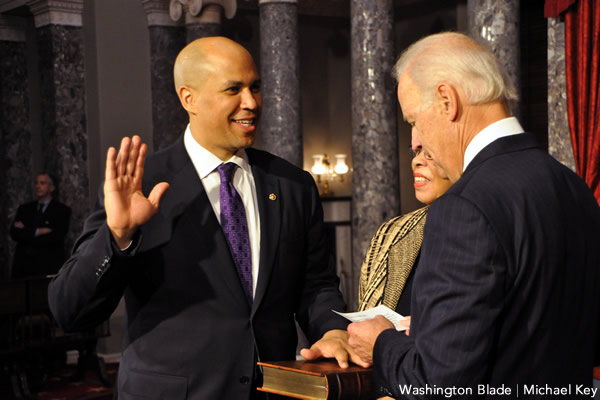
Sen. Cory Booker (D-N.J.) (Washington Blade photo by Michael Key)
“Well, it didn’t take me long to realize that the root of my hatred did not lie with gays but with myself. It was my problem. A problem I dealt with by ceasing to tolerate gays and instead seeking to embrace them.”
Newark, N.J., Mayor Corey Booker in a 1992 op-ed where he wrote about coming to terms with his negative feelings toward homosexuals. (Stanford Daily, Jan. 9)
“Just letting you know… that using ‘your gay’ as a way to put someone down ain’t ok! #notcool delete that out ur vocab”
NBA star Kobe Bryant of the Los Angeles Lakers, responding via Twitter to someone using “you’re gay” as an insult. In 2011, Bryant was fined $100,000 for calling an NBA official a fag. (CBS Sports, Feb. 11)
“I don’t think it’s very controversial to suggest that a candidate who favors gay marriage and free contraception might have more appeal to a younger demographic. Does anyone want to argue … that there are more gay rights organizations on college campuses than in VFW halls?
— Stuart Stevens, Mitt Romney’s lead presidential campaign strategist, in an op-ed about what caused Romney to lose to President Obama. (Washington Post, Feb. 24)
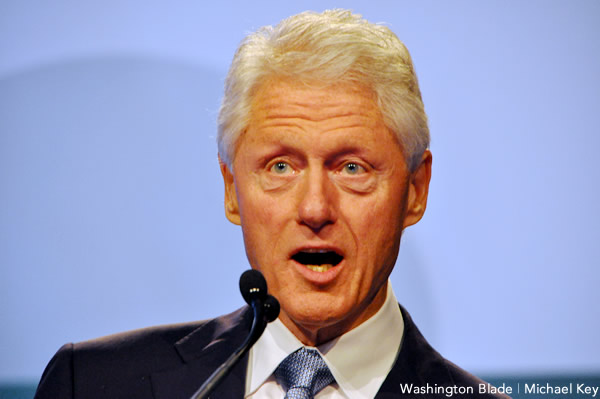
President Bill Clinton (Washington Blade photo by Michael Key)
“As the president who signed the act into law, I have come to believe that DOMA is … incompatible with our Constitution.”
Former President Bill Clinton, in a column against the Defense of Marriage Act, which he signed in 1996. The law, which the Supreme Court will take up on March 27, denies federal recognition to same-sex marriages and allows states to ignore same-sex marriages from other states. (Washington Post, March 7)
“Bob is 15 years old, and the only openly gay Scout in a Boy Scout troop. Is it acceptable or unacceptable for the troop leader to allow Bob to tent with a heterosexual boy on an overnight camping trip?”
One of several scenarios included in a Boy Scouts of America survey sent to members and their parents as the BSA considers whether to relax its ban on gay Scouts, volunteers and leaders. The BSA board may consider the policy in May. (Dallas Voice, March 11)
“If you feel, respectfully, that you can get a higher return than the 38 percent you got last year, it’s a free country. You can sell your shares of Starbucks and buy shares in another company. Thank you very much.”
Starbucks CEO Howard Schultz, responding at the company’s annual shareholder meeting to a stock owner who questioned whether the coffee chain was being hurt by its support for same-sex marriage. (NPR.org, March 20)
“Life is life and love is love, and I’m just trying to be a better me, you know what I’m saying?”
Rapper Snoop Lion, asked by paparazzi his stand on gay marriage. “I don’t have a problem with gay people. I got some gay homies,” he also said. (TMZ.com, April 7)
“I think this is going to be good for a lot of black young people who want to come out. E.J. is going to be that symbol — a symbol of hope that they can now come and tell their parents, tell their friends.”
Basketball legend Magic Johnson, who came out as HIV-positive in 1992, on his support for his son, Ervin “E.J.” Johnson III, coming out as gay after being photographed by TMZ holding hands with his boyfriend. (Denver Post, April 7)
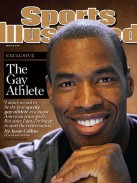
Jason Collins (Image courtesy of Sports Illustrated)
“I’m a 34-year-old NBA center. I’m black. And I’m gay. … If I had my way, someone else would have already done this. Nobody has, which is why I’m raising my hand.”
NBA veteran Jason Collins of the Washington Wizards, coming out in the May 6 issue of Sports Illustrated. Collins becomes the first gay athlete in major U.S. men’s professional sports to come out during his career. (Sports Illustrated, released online April 29)
“In making the film, the socio-political aspect of it was not really in my mind but I was focused on … trying to make this relationship as believable and realistic as we could. When this issue comes up, of equal rights for gays, I am hoping 50 years from now we will look back on this and wonder why this was even a debate and why it took so long.”
Director Steven Soderbergh discussing his latest film, Liberace biopic “Behind the Candlebra,” which made its Cannes debut May 21 (Reuters, May 21)

Robbie Rogers (Photo by Noah Salzman via Wikimedia Commons)
“I’ve been on this huge journey to figure out my life, and now I am back here I think where I am supposed to be.”
Professional soccer player Robbie Rogers in a May 26 post-game press conference after his debut with the LA Galaxy made him the first openly gay athlete to compete in U.S. men’s professional team sports. Rogers, a former national team player, came out in April and announced his retirement. (YouTube, May 27)
“Our community has been targets of bigotry, bias, profiling and violence. We have experienced the heart-breaking despair of young people targeted for who they are, who they are presumed to be, or who they love … Every person, regardless of race, religion, sexual orientation or gender identity, must be able to walk the streets without fear for their safety.”
Open letter from national LGBT organizations supporting a federal investigation into Trayvon Martin’s death after his accused killer was found not guilty. (Press release, July 15)
“We welcome all individuals regardless of sexual orientation into our ballparks, along with those of different races, religions, genders and national origins. Both on the field and away from it, Major League Baseball has a zero-tolerance policy for harassment and discrimination based on sexual orientation.”
MLB Commissioner Bud Selig, announcing new code of conduct that will be distributed individually to professional baseball players at every level of the game. (New York Attorney General’s Office press release, July 16)
“If someone is gay and he searches for the Lord and has good will, who am I to judge?”
Pope Francis, head of the Roman Catholic Church, telling reporters that he would not judge priests for their sexual orientation. The former pope, Benedict XVI, had said gay men should not be priests. (New York Times, July 29)
“If you take men and lock them in a house for five years and tell them to come up with two children and they fail to do that, then we will chop off their heads.”
Zimbabwe President Robert Mugabe, stating at a rally that homosexuality “seeks to destroy our lineage” and Zimbabwe will not “accept the homosexuality practice” even if it costs the country U.S. aid. (News Day, July 25)
“As an openly gay African American, Mr. Rustin stood at the intersection of several of the fights for equal rights.”
White House press release announcing that Bayard Rustin, who helped organize the 1963 March on Washington, will be posthumously awarded the Presidential Medal of Freedom. Sally Ride, the first female American astronaut in space, will also receive the Medal of Freedom; she became known publicly as gay when her obituary listed her longtime partner. (Aug. 8)
“I was excited to hear today that more states legalized gay marriage. I, however, am not currently getting married, but it is great to know I can now, should I wish to.”
Actress Raven-Symone, who gained fame as a child on “The Cosby Show,” coming out in a statement after tweeting, “I can finally get married! Yay government! So proud of you.” (Washington Times, Aug. 4)
“Dude, lesbians love me. I’m tall, I have a deep voice, I’m like, ‘Hello, catnip!’ Now that this show’s out I’m curious what happens from here because whenever I go out lesbians try to, y’know, turn me.”
Actress Laura Prepon, discussing playing lesbian drug dealer Alex Vaus on “Orange is the New Black.” (Canada.com, Aug. 1)

Russian President Vladimir Putin (Photo public domain)
“Putin, end your war on Russian gays!” a shout by an unidentified man at the Metropolitan Opera’s opening night of Tchaikovsky’s “Eugene Onegin.” Gay activists protested the opera to bring awareness to Russia’s law banning “propaganda on nontraditional sexual relationships” that President Vladimir Putin signed into law in June. (Sept. 23, The New York Times)
“I am usually a very strong and confident person, but I have my moments too. Although there was positive feedback, there was a lot of negative too, and the negative affected me more than it ever has before. I recorded this because I didn’t know how else to vent, I didn’t want to talk to anybody.” – Cassidy Lynn Campbell, a transgender teen who was named Huntington Beach high school homecoming queen, in a YouTube post where she was visibly upset by negative reactions. (Sept. 23, Los Angeles Times)
“Liz — this isn’t just an issue on which we disagree you’re just wrong — and on the wrong side of history.” Mary Cheney responding on Facebook on Nov. 17 to her sister’s response on “Fox New Sunday” saying she opposed same-sex marriage and that was an area where she and her sister disagreed. Liz Cheney is running for U.S. Senate in Wyoming.
Compiled by Georgia Voice
Federal Government
Treasury Department has a gay secretary but LGBTQ staff are under siege
Agency reverses course on LGBTQ inclusion under out Secretary Scott Bessent

A former Treasury Department employee who led the agency’s LGBTQ employee resource group says the removal of sexual orientation and gender identity (SOGI) from its discrimination complaint forms was merely a formalization of existing policy shifts that had already taken hold following the second inauguration of President Donald Trump and his appointment of Scott Bessent — who is gay — to lead the agency.
Christen Boas Hayes, who served on the policy team at Treasury’s Financial Crimes Enforcement Network (FinCEN) from 2020 until March of this year, told the Washington Blade during a phone interview last week that the agency had already stopped processing internal Equal Employment Opportunity (EEO) complaints on the basis of anti-LGBTQ discrimination.
“So the way that the forms are changing is a procedural recognition of something that’s already happening,” said Hayes. “Internally, from speaking to two EEO staff members, the changes are already taking place from an EEO perspective on what kind of cases will be found to have the basis for a complaint.”
The move, they said, comes amid the deterioration of support structures for LGBTQ workers at the agency since the administration’s early rollout of anti-LGBTQ executive orders, which led to “a trickle down effect of how each agency implements those and on what timeline,” decisions “typically made by the assistant secretary of management’s office and then implemented by the appropriate offices.”
At the end of June, a group of U.S. House Democrats including several out LGBTQ members raised alarms after a Federal Register notice disclosed Treasury’s plans to revise its complaint procedures. Through the agency’s Office of Civil Rights and EEO, the agency would eliminate SOGI as protected categories on the forms used by employees to initiate claims of workplace discrimination.
But Hayes’s account reveals that the paperwork change followed months of internal practice, pursuant to a wave of layoffs targeting DEI personnel and a chilling effect on LGBTQ organizing, including through ERGs.
Hayes joined Treasury’s FinCEN in 2020 as the agency transitioned into the Biden-Harris administration, working primarily on cryptocurrency regulation and emerging technologies until they accepted a “deferred resignation” offer, which was extended to civil servants this year amid drastic staffing cuts.
“It was two things,” Hayes said. “One was the fact that the policy work that I was very excited about doing was going to change in nature significantly. The second part was that the environment for LGBTQ staff members was increasingly negative after the release of the executive orders,” especially for trans and nonbinary or gender diverse employees.
“At the same time,” Hayes added, “having been on the job for four years, I also knew this year was the year that I would leave Treasury. I was a good candidate for [deferred resignation], because I was already planning on leaving, but the pressures that emerged following the change in administration really pushed me to accelerate that timeline.”
Some ERGs die by formal edict, others by a thousand cuts
Hayes became involved with the Treasury LGBTQ ERG shortly after joining the agency in 2020, when they reached out to the group’s then-president — “who also recently took the deferred resignation.”
“She said that because of the pressure that ERGs had faced under the first Trump administration, the group was rebuilding, and I became the president of the group pretty quickly,” Hayes said. “Those pressures have increased in the second Trump administration.”
One of the previous ERG board members had left the agency after encountering what Hayes described as “explicitly transphobic” treatment from supervisors during his gender transition. “His supervisors denied him a promotion,” and, “importantly, he did not have faith in the EEO complaint process” to see the issues with discrimination resolved, Hayes said. “And so he decided to just leave, which was, of course, such a loss for Treasury and our Employee Resource Group and all of our employees at Treasury.”
The umbrella LGBTQ ERG that Hayes led included hundreds of members across the agency, they said, and was complemented by smaller ERGs at sub-agencies like the IRS and FinCEN — several of which, Hayes said, were explicitly told to cease operations under the new administration.
Hayes did not receive any formal directive to shutter Treasury’s ERG, but described an “implicit” messaging campaign meant to shut down the group’s activities without issuing anything in writing.
“The suggestion was to stop emailing about anything related to the employee resource group, to have meetings outside of work hours, to meet off of Treasury’s campus, and things like that,” they said. “So obviously that contributes to essentially not existing functionally. Because whereas we could have previously emailed our members comfortably to announce a happy hour or a training or something like that, now they have to text each other personally to gather, which essentially makes it a defunct group.”
Internal directories scrubbed, gender-neutral restrooms removed
Hayes said the dismantling of DEI staff began almost immediately after the executive orders. Employees whose position descriptions included the terms “diversity, equity, and inclusion” were “on the chopping block,” they said. “That may differ from more statutorily mandated positions in the OMWI office or the EEO office.”
With those staff gone, so went the infrastructure that enabled ERG programming and community-building. “The people that made our employee resource group events possible were DEI staff that were fired. And so, it created an immediate chilling effect on our employee resource group, and it also, of course, put fear into a lot of our members’ hearts over whether or not we would be able to continue gathering as a community or supporting employees in a more practical way going forward. And it was just, really — it was really sad.”
Hayes described efforts to erase the ERGs from internal communication channels and databases. “They also took our information off internal websites so nobody could find us as lawyers went through the agency’s internal systems to scrub DEI language and programs,” they said.
Within a week, Hayes said, the administration had removed gender-neutral restrooms from Main Treasury, removed third-gender markers from internal databases and forms, and made it more difficult for employees with nonbinary IDs to access government buildings.
“[They] made it challenging for people with X gender markers on identification documents to access Treasury or the White House by not recognizing their gender marker on the TWAVES and WAVES forms.”
LGBTQ staff lack support and work amid a climate of isolation
The changes have left many LGBTQ staff feeling vulnerable — not only because of diminished workplace inclusion, but due to concerns about job security amid the administration’s reductions in force (RIFs).
“Plenty of people are feeling very stressed, not only about retaining their jobs because of the layoffs and pending questions around RIFs, but then also wondering if they will be included in RIF lists because they’re being penalized somehow for being out at work,” Hayes said. “People wonder if their name will be given, not because they’re in a tranche of billets being laid off, but because of their gender identity or sexual orientation.”
In the absence of functional ERGs, Hayes said, LGBTQ employees have been cut off from even informal networks of support.
“Employees [are] feeling like it’s harder to find members of their own community because there’s no email anymore to ask when the next event is or to ask about navigating healthcare or other questions,” they said. “If there is no ERG to go to to ask for support for their specific issue, that contributes to isolation, which contributes to a worse work environment.”
Hayes said they had not interacted directly with Secretary Bessent, but they and others observed a shift from the previous administration. “It is stark to see that our first ‘out’ secretary did not host a Pride event this year,” they said. “For the last three years we’ve flown the rainbow Pride flag above Treasury during Pride. And it was such a celebration among staff and Secretary Yellen and the executive secretary’s office were super supportive.”
“Employees notice changes like that,” they added. “Things like the fact that the Secretary’s official bio says ‘spouse’ instead of ‘husband.’ It makes employees wonder if they too should be fearful of being their full selves at work.”
The Blade contacted the Treasury Department with a request for comment outlining Hayes’s allegations, including the removal of inclusive infrastructure, the discouragement of ERG activity, the pre-formalization of EEO policy changes, and the targeting of DEI personnel. As of publication, the agency has not responded.
U.S. Supreme Court
Supreme Court to consider bans on trans athletes in school sports
27 states have passed laws limiting participation in athletics programs

The U.S. Supreme Court on Thursday agreed to hear two cases involving transgender youth challenging bans prohibiting them from participating in school sports.
In Little v. Hecox, plaintiffs represented by the ACLU, Legal Voice, and the law firm Cooley are challenging Idaho’s 2020 ban, which requires sex testing to adjudicate questions of an athlete’s eligibility.
The 9th U.S. Circuit Court of Appeals described the process in a 2023 decision halting the policy’s enforcement pending an outcome in the litigation. The “sex dispute verification process, whereby any individual can ‘dispute’ the sex of any female student athlete in the state of Idaho,” the court wrote, would “require her to undergo intrusive medical procedures to verify her sex, including gynecological exams.”
In West Virginia v. B.P.J., Lambda Legal, the ACLU, the ACLU of West Virginia, and Cooley are representing a trans middle school student challenging the Mountain State’s 2021 ban on trans athletes.
The plaintiff was participating in cross country when the law was passed, taking puberty blockers that would have significantly reduced the chances that she could have a physiological advantage over cisgender peers.
“Like any other educational program, school athletic programs should be accessible for everyone regardless of their sex or transgender status,” said Joshua Block, senior counsel for the ACLU’s LGBTQ and HIV Project. “Trans kids play sports for the same reasons their peers do — to learn perseverance, dedication, teamwork, and to simply have fun with their friends,” Block said.
He added, “Categorically excluding kids from school sports just because they are transgender will only make our schools less safe and more hurtful places for all youth. We believe the lower courts were right to block these discriminatory laws, and we will continue to defend the freedom of all kids to play.”
“Our client just wants to play sports with her friends and peers,” said Lambda Legal Senior Counsel Tara Borelli. “Everyone understands the value of participating in team athletics, for fitness, leadership, socialization, and myriad other benefits.”
Borelli continued, “The U.S. Court of Appeals for the Fourth Circuit last April issued a thoughtful and thorough ruling allowing B.P.J. to continue participating in track events. That well-reasoned decision should stand the test of time, and we stand ready to defend it.”
Shortly after taking control of both legislative chambers, Republican members of Congress tried — unsuccessfully — to pass a national ban like those now enforced in 27 states since 2020.
Federal Government
UPenn erases Lia Thomas’s records as part of settlement with White House
University agreed to ban trans women from women’s sports teams

In a settlement with the Trump-Vance administration announced on Tuesday, the University of Pennsylvania will ban transgender athletes from competing and erase swimming records set by transgender former student Lia Thomas.
The U.S. Department of Education’s Office for Civil Rights found the university in violation of Title IX, the federal rights law barring sex based discrimination in educational institutions, by “permitting males to compete in women’s intercollegiate athletics and to occupy women-only intimate facilities.”
The statement issued by University of Pennsylvania President J. Larry Jameson highlighted how the law’s interpretation was changed substantially under President Donald Trump’s second term.
“The Department of Education OCR investigated the participation of one transgender athlete on the women’s swimming team three years ago, during the 2021-2022 swim season,” he wrote. “At that time, Penn was in compliance with NCAA eligibility rules and Title IX as then interpreted.”
Jameson continued, “Penn has always followed — and continues to follow — Title IX and the applicable policy of the NCAA regarding transgender athletes. NCAA eligibility rules changed in February 2025 with Executive Orders 14168 and 14201 and Penn will continue to adhere to these new rules.”
Writing that “we acknowledge that some student-athletes were disadvantaged by these rules” in place while Thomas was allowed to compete, the university president added, “We recognize this and will apologize to those who experienced a competitive disadvantage or experienced anxiety because of the policies in effect at the time.”
“Today’s resolution agreement with UPenn is yet another example of the Trump effect in action,” Education Secretary Linda McMahon said in a statement. “Thanks to the leadership of President Trump, UPenn has agreed both to apologize for its past Title IX violations and to ensure that women’s sports are protected at the university for future generations of female athletes.”
Under former President Joe Biden, the department’s Office of Civil Rights sought to protect against anti-LGBTQ discrimination in education, bringing investigations and enforcement actions in cases where school officials might, for example, require trans students to use restrooms and facilities consistent with their birth sex or fail to respond to peer harassment over their gender identity.
Much of the legal reasoning behind the Biden-Harris administration’s positions extended from the 2020 U.S. Supreme Court case Bostock v. Clayton County, which found that sex-based discrimination includes that which is based on sexual orientation or gender identity under Title VII rules covering employment practices.
The Trump-Vance administration last week put the state of California on notice that its trans athlete policies were, or once were, in violation of Title IX, which comes amid the ongoing battle with Maine over the same issue.
-

 Federal Government2 days ago
Federal Government2 days agoTreasury Department has a gay secretary but LGBTQ staff are under siege
-

 Virginia3 days ago
Virginia3 days agoDefying trends, new LGBTQ center opens in rural Winchester, Va.
-

 District of Columbia2 days ago
District of Columbia2 days agoGay GOP group hosts Ernst, 3 House members — all of whom oppose Equality Act
-

 District of Columbia2 days ago
District of Columbia2 days agoD.C. police seek public’s help in July 5 murder of trans woman

